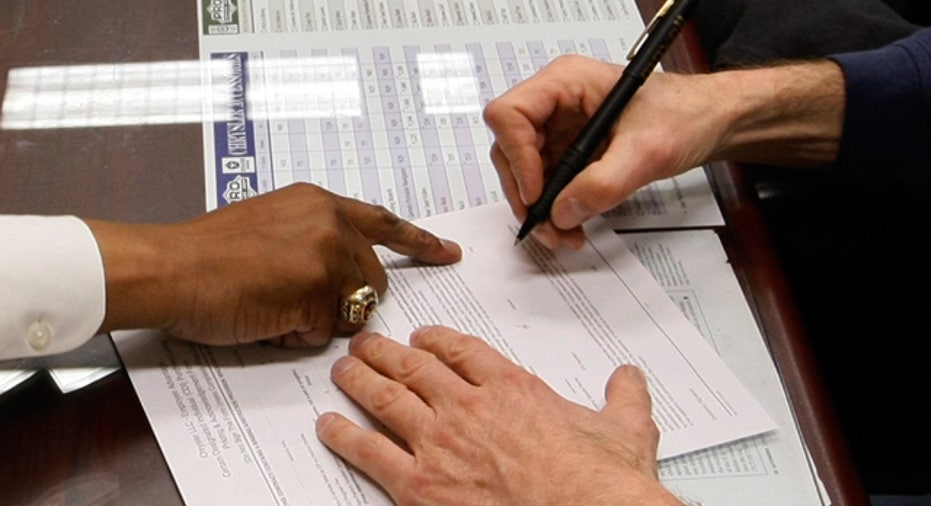Consumer Bet Gets Riskier for Banks

Big banks are socking away more money to cover possible losses on consumer loans, as their executives warn the long boom in credit quality has peaked. Lenders including J.P. Morgan Chase & Co., Wells Fargo & Co., Capital One Financial Corp. and Discover Financial Services said on earnings calls this month that they have bolstered their reserves -- in some cases for the first time in years -- to prepare for an uptick in loan losses. The higher reserves in part reflect efforts to expand loan volume. As competition for borrowers intensifies, some lenders also are lowering credit-score requirements and taking on riskier customers. But they also stem from a growing conviction that improvements in credit quality have come to an end. "We've had the best of times," John Shrewsberry, Wells Fargo's chief financial officer, said on the bank's earnings call last week. "It probably gets a little bit more average." Wells Fargo added $150 million to its loan-loss reserves in the second quarter, primarily because of loan growth, after adding $200 million in the first quarter. They were the first reserve builds for the bank since the end of 2009. Capital One said Thursday that it added $290 million in reserves for its domestic credit-card business, a move that was driven both by growth in customers' outstanding balances and by the expectation that more would default. The bank also added to auto-loan reserves, partly because of growth in loan volume that included a higher portion of subprime borrowers. The bank said that this year it has increased auto lending to borrowers with lower credit scores. J.P. Morgan added $250 million of reserves for credit-card losses in the second quarter, saying it expects loss rates to pick up. The bank last added to card reserves in the fourth quarter of 2009, when default rates on general-purpose credit cards were rising across the industry. The moves don't mean credit quality is about to decline sharply. Banks say consumers' financial health remains strong overall, and they cite a low unemployment rate, rising home values and default rates that remain near historic lows as reasons to be optimistic about consumers. But they do show the balancing act banks face as they negotiate a period of extremely low interest rates that are eating into profit margins. Borrowers with lower credit scores pay higher interest rates and are more likely to carry credit-card balances, which could bolster bank revenues. By slightly loosening standards for loans, banks are betting that the increase in revenue will outweigh any increases in loan losses. "Lenders are more willing or have to take on more risk to grow," said John Hecht, an equity analyst at Jefferies Group LLC. Defaults on general-purpose credit cards rose to 3.11% in June from 2.88% a year earlier, according to data released Tuesday by S&P/Experian Consumer Credit Default Indices. Defaults increased each of the first five months of the year after mostly falling since early 2010, according to the data. Auto loans, a fast-growing category of credit, also have taken a shakier turn. Some 0.91% of auto-loan dollars were in default as of June, down from May but up from 0.85% a year earlier, according to S&P/Experian. More broadly, 13.3% of U.S. households are expected to miss a minimum required payment on at least one of their debts during the third quarter, the highest since the end of 2014, according to a June survey by the Federal Reserve Bank of New York. The figure has been rising since hitting a 2016 low of 11.5% in March. Banks that are loosening their credit standards to make more loans and get higher yields will be more exposed to such trends. J.P. Morgan has been lowering the credit scores it requires and issuing cards to lend to more "near-prime" borrowers over the past two to three years, Chief Financial Officer Marianne Lake said on the bank's earnings call last week. Some 20% to 30% of J.P. Morgan's new cards are given to borrowers with FICO credit scores below 700, she said, referring to the scale that ranges from 300 to 850. Many large banks are holding off on extending credit to borrowers with lower scores. Bank of America Corp. and Citigroup Inc. indicated in recent days that they weren't planning to loosen lending restrictions. Wells Fargo has also said it hasn't loosened criteria. Discover said this week that it was willing to lend to borrowers with slightly lower credit scores to help boost loan growth. The company's credit-card net charge-off rate reached 2.39% in the second quarter, up 0.11 percentage points from a year earlier. Net charge-offs for its private student loans and personal loans also increased. "What you are getting is a very benign cycle, but delinquencies almost have to rise a bit to get to normal levels," David Nelms, Discover's chief executive, said in an interview after the lender reported earnings on Tuesday.



















